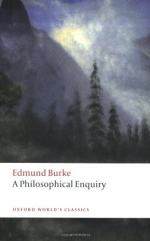
|
| Name: _________________________ | Period: ___________________ |
This test consists of 5 short answer questions, 10 short essay questions, and 1 (of 3) essay topics.
Short Answer Questions
1. What quality of mind does Burke find in women that he thinks is analogous to fragility?
2. To which human faculty does Burke opine proportion belongs?
3. What caveat does Burke offer to his readers about "A Philosophical Enquiry Into the Origin of Our Ideas of the Sublime and Beautiful"?
4. Which principle fits the image of a long, bare wall, according to Burke?
5. What are the three effects of words Burke identifies?
Short Essay Questions
1. Why, according to Burke, is proportion not the cause of beauty in vegetation and animals?
2. How can pain be a cause of delight, in everyday life and in effecting the sublime?
3. What does Burke mean by "fitness," and why is fitness not, according to him, the cause of beauty?
4. What does Burke assert affects the mind besides natural causes, and how does this thing relate to natural causes?
5. How does Burke define deformity?
6. What is unique about the historical figure of Campanella, as related by Burke?
7. Summarize the difference between Locke's idea of the nature of darkness and Burke's idea of the nature of darkness.
8. According to Burke, why is the taste of sweetness pleasant, and how does he decide this?
9. Briefly summarize the three classes of words that Burke identifies.
10. What is beautiful in feeling, according to Burke?
Essay Topics
Write an essay for ONE of the following topics:
Essay Topic 1
Discuss the physical effects of fear and pain, as observed by Burke. How do people in pain look or sound, and what is their state of mind? What passions could they be experiencing? What is the difference Burke identifies between fear and pain, as related to the body and the mind? How can pain be a cause of delight, in everyday life and in effecting the sublime? What examples does Burke use to prove this point?
Essay Topic 2
Discuss Burke's assertion that words may offer a greater interaction with the sublime or the beautiful than an experience with a sublime or beautiful object. Where, when, and how do we gain our general understanding of words and ideas, and how do we learn to become affected by them? What, according to Burke, is the primary strength of poetry? What role do human passions have in poetry? What, to Burke, is the most affecting type of language in poetry and literature? Why, according to Burke, are humans readily affected by the passions of others? How does descriptive poetry operate, according to Burke? How is this different from the operation of dramatic poetry? What are the "weaknesses" of words that Burke mentions on page 160? On the other hand, what are the great strengths of words? For instance, are words versatile, flexible, strong, etc.?
Essay Topic 3
Summarize Locke's idea of the nature of darkness and Burke's idea of the nature of darkness. Where do they differ? Why does Burke think differently than Locke, and what examples does he use to support his opinion? How does darkness affect the body and the mind, according to Burke? Do you think the cultural associations we have with darkness (the general theme of it and the common things it symbolizes) can be relevant to our view of darkness, in addition to or instead of Burke's opinion of darkness' nature?
|
This section contains 1,212 words (approx. 5 pages at 300 words per page) |

|




